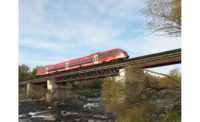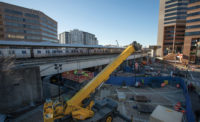A joint venture of contractors SNC-Lavalin, EllisDon and ACS Infrastructure is on the hot seat over a series of derailments on a $1.7-billion light rail line in Ottawa the companies built and are now also maintaining.
The city of Ottawa issued a notice of default to the Rideau Transit Group (RTG), following Aug. 8 and Sept. 19 derailments on the Confederation Line.
The September accident, in which a train with a dozen passengers veered off the tracks, triggered a shutdown of service on the two-year-old line that has yet to be lifted.
Ottawa’s decision to issue the default notice also came after RTG, which has a $1-billion contract to maintain the line, submitted a repair plan that city officials rejected as lacking.
In addition, the finance committee of the Ottawa City Council voted to have the default confirmed in the courts, a move that could pave the way for city officials to scrap the 30-year maintenance contract.
RTG did not provide a response to ENR, despite multiple queries.
However, city officials contend the default notices cover not just the maintenance of the line, but also “RTG’s performance of the design and construction works,” wrote Michael Morgan, director of Ottawa’s rail construction program.
The city also is considering "all legal options" under the project agreement, Morgan wrote, adding that the default notice "represents strong contractual action" by Ottawa and is “required in order to allow the city to use even stronger actions" with the contractor group under the project agreement.
City officials have also hired an outside firm to review RTG’s efforts to repair the now-idled Confederation Line, having rejected the plan it submitted as unsatisfactory.
In an Oct. 4 memo, City Manager Steve Kanellakos said he had hired Philadelphia-based TRA Inc. to conduct the review, noting the transportation consultant has not done work previously for RTG or its parent companies.
That represented a reversal of an earlier decision to hire rail transportation design firm STV, with Kanellakos canceling the agreement after critics noted the firm had been involved in design of the Confederation Line. While not questioning the firm's "objectivity and expertise," he said "public trust related to the Line "is low right now, and I do not want any perception challenges.”
In the September derailment, two axles on the train’s second car, with 13 passengers, became dislodged, causing it to peel off the tracks west of Ottawa’s Tremblay Station.
The derailment caused “significant damage to the train, the track, and a switch box,” Morgan wrote, while Ottawa Fire Services responded to the scene and helped evacuate passengers.
City officials, along with investigators from the Transportation Safety Board, were then left waiting “more than three hours” for contractor representatives to show up, Morgan wrote. He termed the firms' response "disappointing" since the September deerailment.
In the earlier derailment on Aug. 14, an axle broke on an out of service train at Tunney’s Pasture Station, “causing the wheel on one of the train cars to derail,” Morgan stated.
City officials actually issued the default notices on Sept. 24, but only made them public in early October, at a council meeting. Ottawa sent an earlier default notice to RTG in March, noting in its September notice that the earlier issues remain unresolved.
In response to the August derailment, RTG forwarded a response from Alstom, the subcontractor that delivered the rail cars, which contended that another subsidiary, RTG Engineering Joint Venture, was responsible for track design.
"To be clear, RTG bears responsibility for all of its subcontractors.” wrote Morgan,.
But issues with the Confederation Line may in part extend beyond the work of RTG and its subcontractors to specifications laid out by city transit officials, said David Jeanes, a board member and former president of Transport Action Canada, a national transportation advocacy group.
The city required that the light rail cars be level with the station platform to enable access by disabled passengers. This required a redesign of the cars, which previously had gearboxes placed underneath that had requiried passengers to step up, he said. The light rail cars have also been operated at higher commuter-rail speeds, which added to wear and tear of wheels that are smaller than those on a commuter train.
“The city is trying to put as much pressure as it can on RTG,” Jeanes said. “The city is rattling is sabers saying it might just cancel the maintenance contract.”






Post a comment to this article
Report Abusive Comment